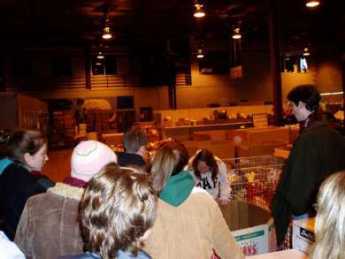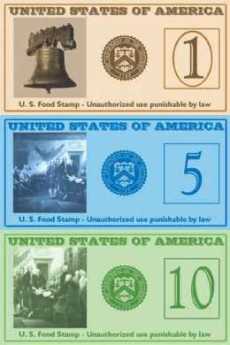Related Topics
Customs, Culture and Traditions
Abundant seafood made it easy to settle here. Agriculture takes longer.
Volunteerism
The characteristic American behavior called volunteerism got its start with Benjamin Franklin's Junto, and has been a source of comment by foreign visitors ever since. It's still a very active force.
Indigents
With a long history of welcoming and assisting the poor, Philadelphia has always risked swamping the lifeboat by attracting more of them than it can handle.
Favorites - II
More favorites. Under construction.
Loaves and Fishes

|
| Philadelphia Food Bank |
Philadelphia is full of people and institutions that have done wonderful things without a lot of fanfare and hype, butPhilabundance and its executive director, Bill Clark, surely set some sort of record. The organization has been in existence for twenty years and is generally known as a nice charity that gives surplus food to poor people. And how.
With a four-million dollar budget, they distribute food at a cost of about ten cents a meal. From that, you can easily calculate they are both efficient and big, very big. For a long time, they collected left-over food from restaurants and caterers and gave it to poor folks in shelters. But that was before someone had the brilliant idea to hire an executive director who had formerly been an executive in the supermarket business, rather than a dietician or a social worker or a retired lawyer. Nowadays, Philabundance still takes the calls from restaurants and caterers but refers them to some local food bank to do the pickup. And it doesn't distribute food to the poor itself, instead, it helps new churches get established in poverty regions, showing them how to organize and run food distribution agencies, or stores or kitchens.

|
| Philabundance |
Philabundance is going for big deliveries, and cutting the big costs in the food chain. Clark knew who was dumping the food, by the carload, and it wasn't restaurants. He organized a system of collecting bread from major bakeries, fruit from major importers, meat from the food distribution center -- in carload lots. Someone from inside the food distribution system knows how tightly organized the shelf life is, and if he can get bananas to his eaters in five days, he can have them free from people who absolutely must have eleven days to get them through a delivery chain of fussy people picking and choosing what is on display before they buy. In a market system where food is routinely discarded in order to maintain stable prices (ask any farmer), someone who knows what he is doing can really get some bargains for the poor. You have to know about taxes, too. Donations of food are not just deductible at cost, but at cost plus half of the normal mark-up. A great many of the cargo containers arrive at Philabundance warehouse, unopened because they arrived too late for the weekend buying rush, and would otherwise have to be sold at low Monday prices. There's a lot to learn about this business.

|
| Food stamps |
Food stamps might be a better way to distribute food to the poor, but big cities have an acute shortage of supermarkets, as you soon learn if you live there. New York has an extensive system of neighborhood mom and pop groceries, but Philadelphia doesn't. It's hard to know whether mom and pop stores can't survive in Philadelphia for some reason, or whether New York's notoriously political-legal system is slanted in favor of them, along with rent-controlled apartments on Park Avenue. Supermarkets in center city are hampered by the underlying supermarket the assumption that there will be ample place to park a car at both ends of the shopping trip. Since it is easy to pay $300 a month to park in center city, and even then you find the attendant may have parked someone else in the aisles, you can see that the supermarket idea, which largely developed in Philadelphia in the first place, is more popular in the suburbs.
So, anyway if you are going to throw food away you might as well give it to the poor and get a tax deduction. And if you are going to give food to the poor, you might as well be efficient about it. No doubt there will be some who raise the point that making things free for the poor will attract more of them into the region, raising Medicaid costs and so on. Maybe that's why Bill Clark draws so little attention to the splendid job he is doing, but if so, we really must betray him.
Originally published: Monday, June 26, 2006; most-recently modified: Thursday, May 23, 2019
| Posted by: Morey | Jul 28, 2011 9:13 PM |